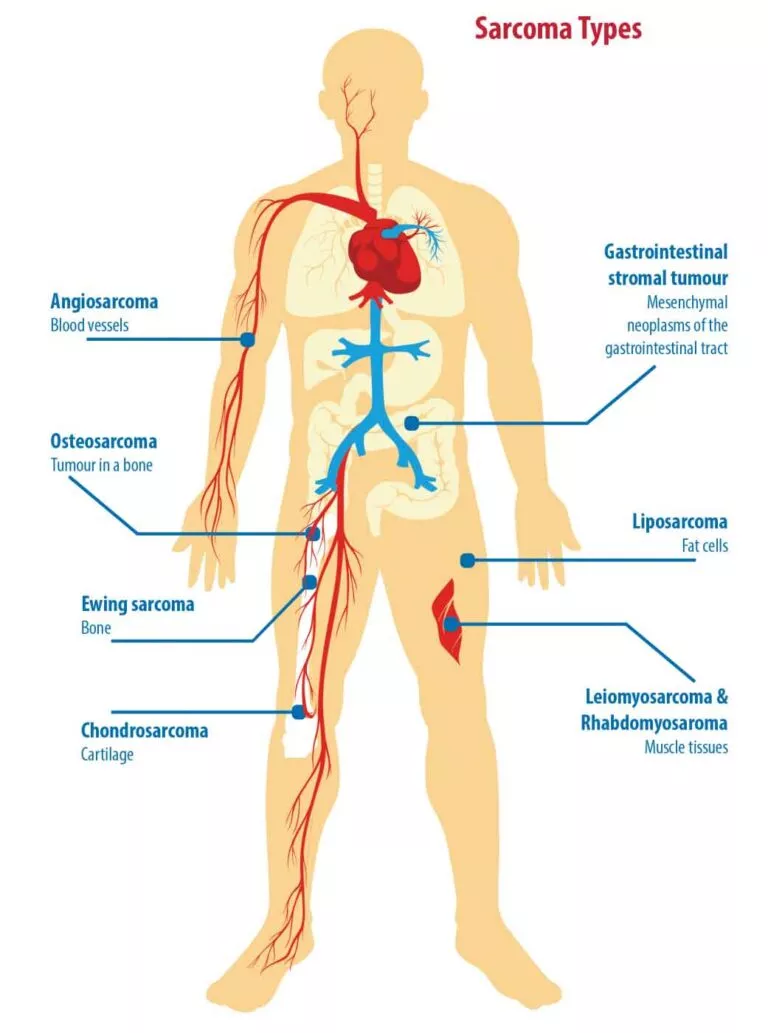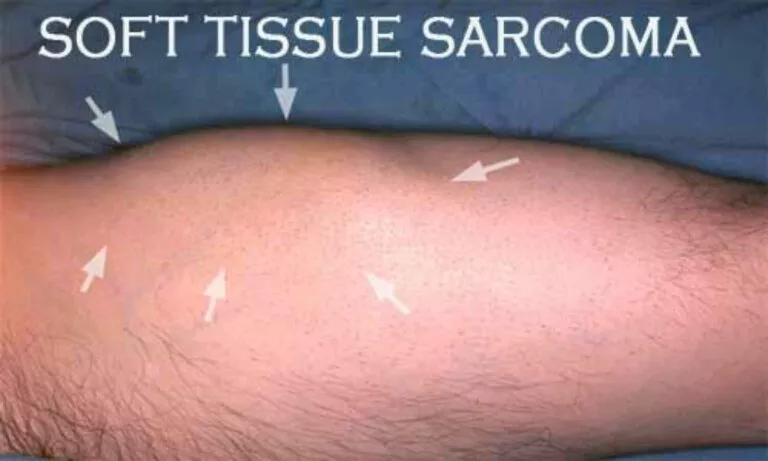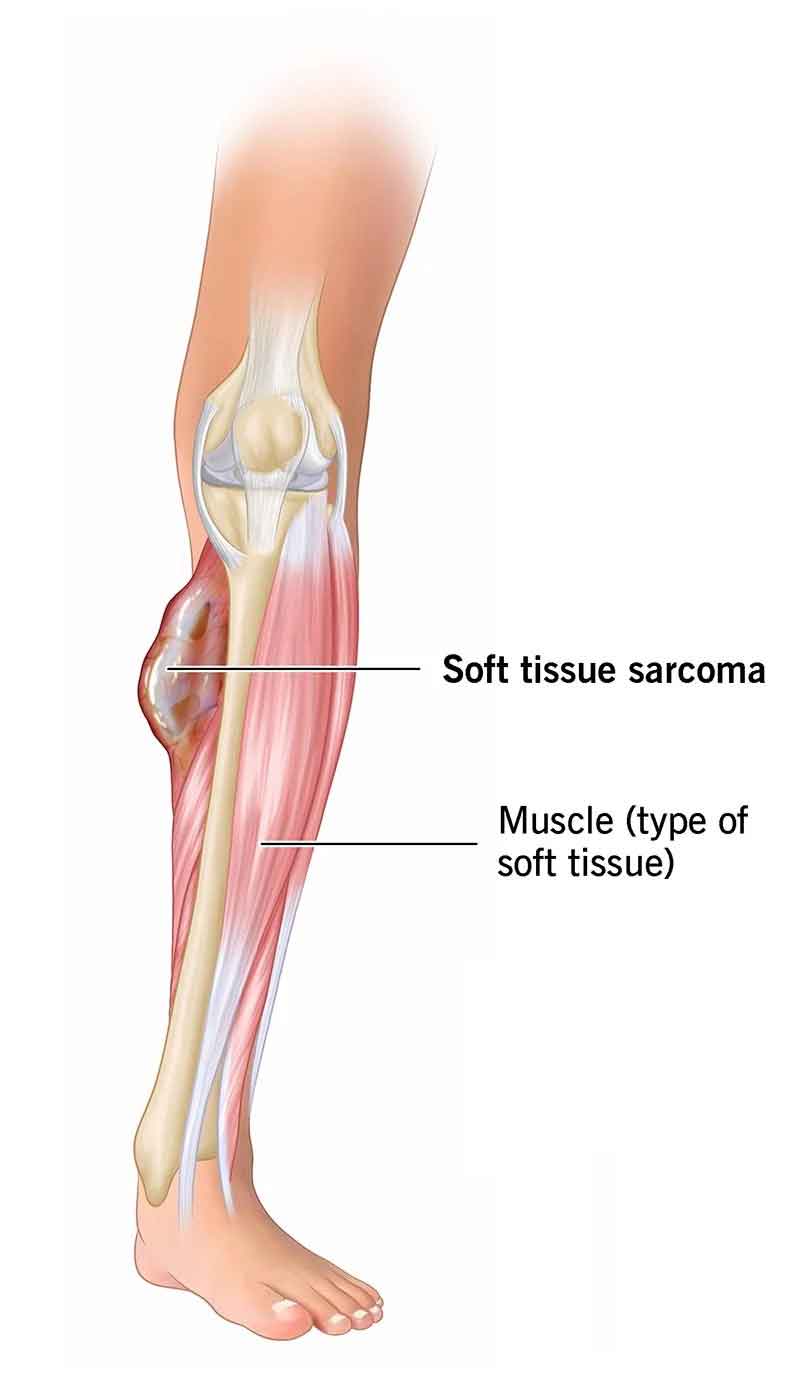WHAT IS SOFT TISSUE SARCOMA?
Soft tissue sarcoma is an uncommon type of cancer that starts in the tissues that connect, support, and surround other body structures. This involves muscle, fat, blood vessels, nerves, tendons, and the lining of your joints.
There are more than fifty subtypes of soft tissue sarcoma. Certain types are more likely to affect children, while others affect mostly adults. These tumors could be difficult to diagnose because they may be mistaken for many other types of growths.
Soft tissue sarcoma could occur anywhere in your body, but the most common types occur in the arms and legs, and in the abdomen. Surgical removal is the most common treatment, although radiation and chemotherapy also may be recommended — depending upon the size, type, location, and aggressiveness of the tumor.
TYPES
- Angiosarcoma
- Dermatofibrosarcoma protuberans
- Epithelioid sarcoma
- Gastrointestinal stromal tumor (GIST)
- Kaposi’s sarcoma
- Leiomyosarcoma
- Liposarcoma
- Malignant peripheral nerve sheath tumors
- Myxofibrosarcoma
- Rhabdomyosarcoma
- Solitary fibrous tumor
- Synovial sarcoma
- Undifferentiated pleomorphic sarcoma
SYMPTOMS:-
A soft tissue sarcoma might not cause any signs and symptoms in its early stages. As the tumor gets bigger, it may cause :
- A noticeable lump or swelling
- Pain, if a tumor presses on nerves and muscles
WHEN SHOULD YOU SEE A DOCTOR?
Book an appointment with your doctor if you have :
- A lump that is increasing in size or gets painful
- A lump of any size that is located deep inside a muscle
- Recurrence of a lump that is been removed
CAUSES:-
In the majority of cases, it is not clear what causes soft tissue sarcoma.
In general, cancer happens when cells develop errors (mutations) in their DNA. The errors make the cells grow and divide out of control. The accumulating abnormal cells form a tumor that could grow to invade nearby structures and the abnormal cells can spread to other parts of the body.
The type of cell that develops the genetic mutation determines what kind of soft tissue sarcoma you have. For example, angiosarcoma starts in the lining of blood vessels, while liposarcoma arises from fat cells. Certain types of soft tissue sarcoma include :
- Angiosarcoma
- Dermatofibrosarcoma protuberans
- Epithelioid sarcoma
- Gastrointestinal stromal tumor (GIST)
- Kaposi’s sarcoma
- Leiomyosarcoma
- Liposarcoma
- Malignant peripheral nerve sheath tumor
- Myxofibrosarcoma
- Rhabdomyosarcoma
- Solitary fibrous tumor
- Synovial sarcoma
- Undifferentiated (pleomorphic sarcoma)
RISK FACTORS:-
Factors that might increase your risk of sarcoma include :
- Inherited syndromes – A risk of soft tissue sarcoma could be inherited from your parents. Genetic syndromes that raise your risk include hereditary retinoblastoma, Li-Fraumeni syndrome, familial adenomatous polyposis, neurofibromatosis, tuberous sclerosis, and Werner syndrome.
- Chemical exposure – Being exposed to specific chemicals, such as herbicides, arsenic, and dioxin may increase the risk of soft tissue sarcomas.
- Radiation exposure – Previous radiation treatment for other cancers could increase the risk of soft tissue sarcomas.
DIAGNOSIS:-
Because there are so many different types of soft tissue sarcoma, it is important to determine the exact nature of each tumor so that the best treatments could be chosen.
Imaging tests
To evaluate the area of concern, your doctor may employ :
- X-rays
- Computerized tomography scans
- Magnetic resonance imaging
- Positron emission tomography
Biopsy
If a soft tissue sarcoma is suspected, it is often best to seek care at a medical center that sees a lot of people with this type of cancer. Experienced doctors will select the best biopsy technique to make sure proper surgical treatment and planning. Options include :
- Core needle biopsy – Tiny tubes of tumor material could be obtained by this method. Doctors generally try to take samples from several sections of the tumor.
- Surgical biopsy – In some cases, your doctor may suggest surgery to obtain a larger sample of tissue or to simply remove a small tumor entirely.
In the laboratory, a doctor trained in analyzing body tissues (pathologist) examines the tissue sample for signs of cancer. The pathologist also analyzes the specimen to understand the type of cancer and to determine whether the cancer is aggressive.
TREATMENT
Your treatment options for soft tissue sarcoma will depend upon the size, type, and location of your tumor.
Surgery
Surgery is a commonly used treatment for soft tissue sarcoma. Surgery usually involves removing cancer and some healthy tissue surrounding it.
When soft tissue sarcoma affects the arms and legs, radiation and chemotherapy might be considered to shrink the tumor to avoid amputation.
Radiation therapy
Radiation therapy includes treating cancer with high-powered beams of energy. Options include :
- Before surgery – Radiation before surgery could help shrink the tumor so that it is easier to remove.
- During surgery – Intraoperative radiation enables a higher dose of radiation to be delivered directly to the target area while sparing surrounding tissues
- After surgery – Postoperative radiation could help kill any remaining cancer cells.
Chemotherapy
Chemotherapy is a drug treatment that uses chemicals to destroy cancerous cells. Chemotherapy could be administered by pill or through a vein (intravenously). Certain forms of soft tissue sarcoma respond better to chemotherapy than others. For example, chemotherapy is often used to treat rhabdomyosarcoma.
Targeted drug treatment
Certain types of soft tissue sarcoma have specific characteristics in their cells that can be attacked through targeted drug treatments. These medicines work better than chemotherapy and are not nearly as toxic. Targeted treatments have been especially helpful in gastrointestinal stromal tumors (GISTs).
If you or anyone you know is suffering from soft tissue sarcoma, our expert providers at Specialty Care Clinics will take care of your health and help you recover.
Call 469-545-9983 to book a telehealth appointment for an at-home check-up.




